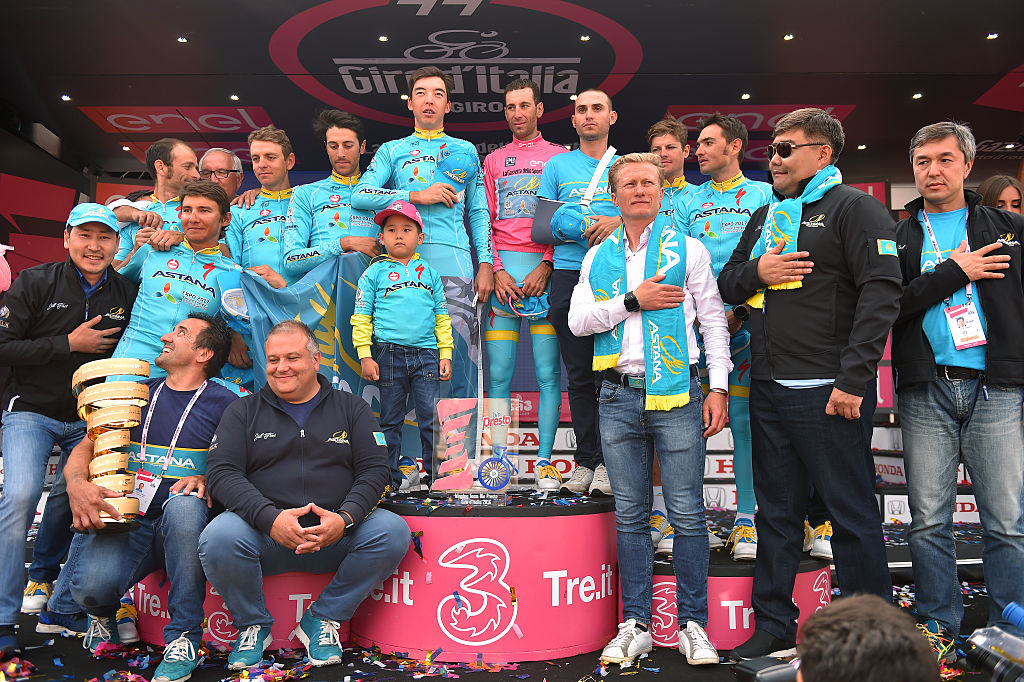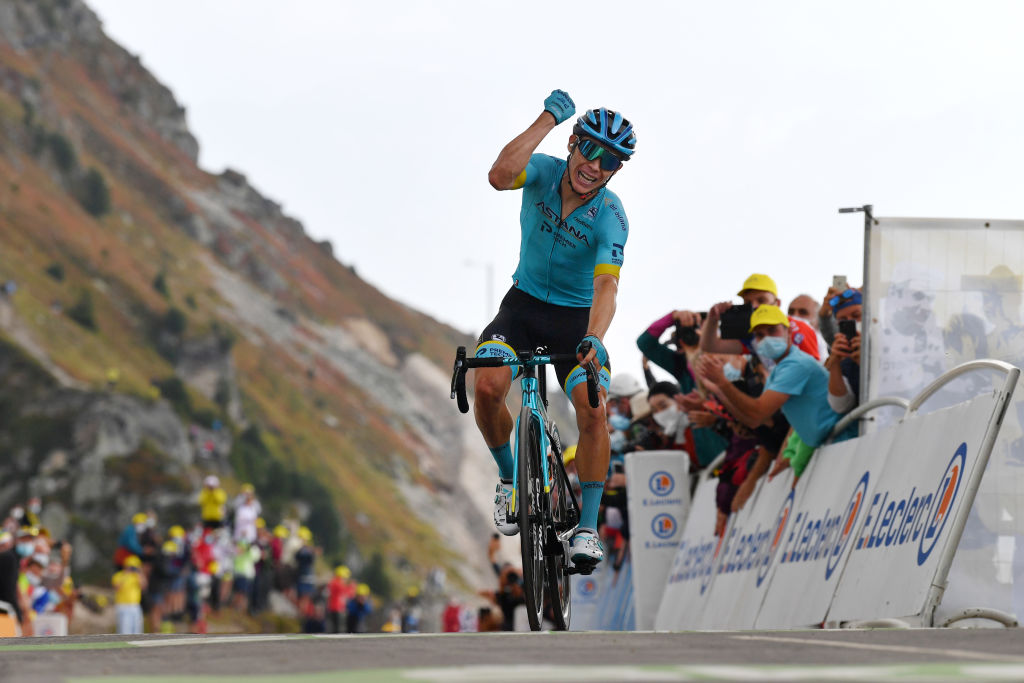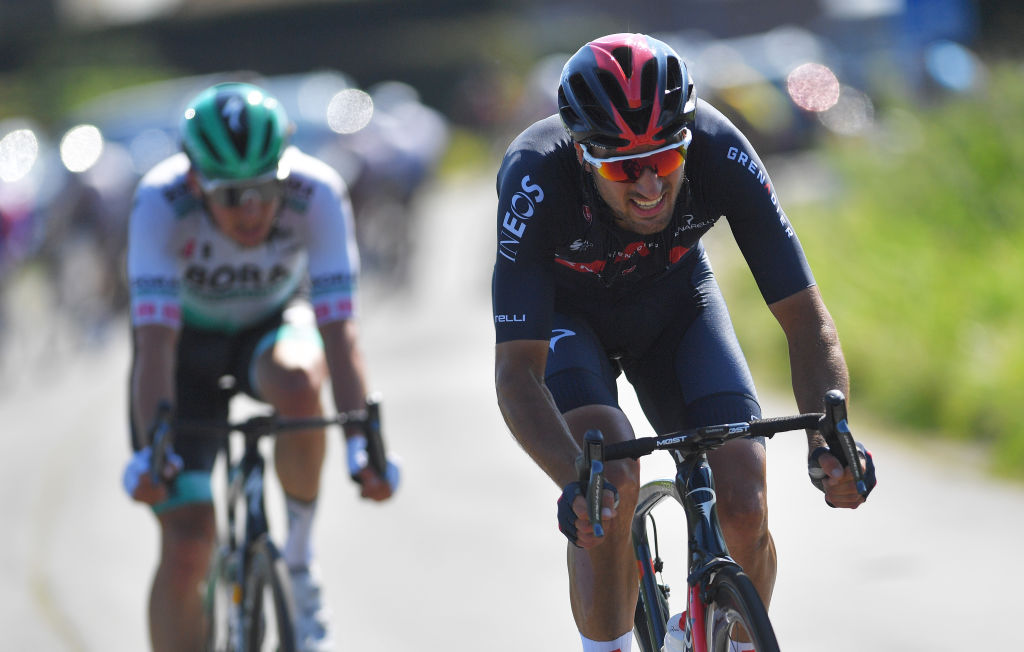Back to the Future: Nibali and López lead Astana's 2022 reboot
Moscon's arrival underscores renewed Italian influence in Kazakhstani squad

Astana has undergone its share of makeovers through the years, notably when Johan Bruyneel held the reins in 2008 and 2009, but early this summer, the Kazakhstani squad looked set for its most radical overhaul yet.
Alexandre Vinokourov, the very man for whom the team had been built in the first place, was deemed surplus to requirements and ousted from his position as general manager ahead of the Tour de France at the behest of co-sponsor Premier Tech.
Needless to say, at least where Astana is concerned, Vinokourov tends to have the last laugh, as men like Bruyneel or Andrey Kashechkin could testify. Premier Tech’s ultimatum to the team’s backers at the Kazakhstani sovereign wealth fund Samruk-Kazyna received what, in hindsight, should have been a most predictable response: Vinokourov was restored as general manager in early August and Premier Tech’s partnership with the team ended after a single season.
It seems that ‘Vino4Ever’ wasn’t just the slogan on Vinokourov’s jersey when he returned from his doping ban in the summer of 2009. It has also been the guiding principle behind this team since its inception in 2006, when a Kazakhstani consortium first stepped in to take over the Liberty Seguros squad in the aftermath of Operacion Puerto in a vain attempt to secure Vinokourov a start at that year’s Tour.
“I always thought that this team was created for Vino and it owes its continuity to Vino,” directeur sportif Giuseppe Martinelli tells Cyclingnews.
The Italian has been part of the management team since 2010 and he described himself as relieved that Vinokourov had been restored to his role as figurehead after the short-lived interregnum in early summer.
“Maybe for the riders, it doesn’t change much, but for the group of people who have worked for this team for years and years, the return of Vino brings serenity to the group and confidence for the future.
Get The Leadout Newsletter
The latest race content, interviews, features, reviews and expert buying guides, direct to your inbox!
Nibali's return
In the weeks following Vinokourov’s restoration, the team announced that it will rebrand as Astana Qazaqstan in 2022 and has also confirmed a dozen new signings for next season, including Gianni Moscon, the USA's Joe Dombrowski and David de la Cruz. But the most eye-catching arrivals are not new faces but rather returning riders, namely Vincenzo Nibali and Miguel Ángel López.
Nibali’s first stint at Astana coincided with the peak of his career, encompassing his victories at the Giro d’Italia (in 2013 and 2016) and the Tour de France (in 2014) as well as his first triumph at Il Lombardia. After three years with Bahrain and two at Trek-Segafredo, he returns to Astana for what is likely – though not yet certain – to be the final season of his career.
Speaking to La Gazzetta dello Sport this week, Nibali revealed that it was Martinelli who first suggested putting the band back together at Tirreno-Adriatico in March.
“He called me over and said, ‘why not come back?’ And I started to think about it,” said Nibali.
“There was always respect between us, a human relationship rather than a working one. I remember some arguments too, of course, but I trust him.”
For 2022, Nibali and Martinelli already appear to be in broad agreement on how to plan his season. Gone are the days of building the campaign around the general classification at the Giro or Tour. Though mitigated by injury, the Italian’s 18th place at this year’s Giro seemed to signal the definitive end of his overall aspiration at Grand Tours at the age of 36.
Next year, Nibali will instead race early and often before the Giro and perhaps ride all five Monuments, including a Paris-Roubaix debut. The emphasis, it seems, will be on aggression.
“He can come here with the serenity of knowing that he has already done everything. He can go to races looking to invent something without having the obligation of being 100 per cent competitive,” Martinelli says.
“He’ll have the freedom to chase a stage win by attacking from distance, for instance, which is something that’s in his DNA.”
Martinelli maintains that Nibali was compelled to temper his attacking nature during his time as a Grand Tour contender, carefully dosing his efforts with a view to saving energy for the following day. Now, as his career runs out of tomorrows, he has, at least in theory, the liberty to indulge those aggressive instincts more fully.
“In the past, he was almost obliged to win. When we went to Tirreno-Adriatico, he had to try to win it, and when he went to the Dauphiné he had to try to win that too,” Martinelli says.
“Now, if we go to the Ruta del Sol, we won’t be going there to prepare for Tirreno. Instead, if Vincenzo feels good, then maybe one day he can attack and if the next day he loses two minutes, so be it, there will be someone else there to think about the GC.
“That’s what I want to do with Vincenzo. I want to try to let him express what has always been in him, but which often he has been prevented from showing. In the past, he has been obliged to do something today yet without losing anything for tomorrow. Now we have the freedom to go for it.”
López back after a season away

Freedom is perhaps the byword, too, for López, who returns to Astana after just one season away.
The Colombian’s campaign at Movistar was, by any measure, a turbulent one. After the beginning of his year was blighted by COVID-19, he hit his stride with wins at the rescheduled Ruta del Sol and the Mont Ventoux Dénivelé Challenge, but there were already faint murmurs of disquiet when he abandoned the Tour and missed the Tokyo Olympics.
López’s Vuelta, capped by stage victory on the Altu d'El Gamoniteiru, looked to have calmed the waters, only for a most unexpected shipwreck on the penultimate stage. He lost his podium place when he was caught on the wrong side of a split in the red jersey group and, in apparent protest at a Movistar strategy that prioritised Enric Mas’ second place, he lost his cool to boot, abandoning the race despite entreaties from management to continue.
Shortly after the Vuelta, Movistar announced that they would part company with López from October 1. Astana immediately emerged as the obvious suitor and there was little surprise when the transfer formally confirmed two weeks ago.
“Fundamentally, he only left us out of a question of economics and nothing else, so it’s not that he left because things were going badly,” suggests Martinelli.
“And what happened at the Vuelta won’t influence his future as a rider. It was a moment where he lost control of himself a bit. But that can happen when you’re fighting for the podium and then at the end, everything goes away from you.”
Even in his time at Astana, López had a mixed relationship with the fourth weekend of Grand Tours.
At the 2019 Giro, for instance, he escaped punishment after lashing out at a fan who caused him to crash on the Croce d’Aune. At the 2020 Tour, he slipped from third to sixth overall following a most subdued display in the time trial to La Planche des Belles Filles.
Martinelli, however, downplayed the idea that there were question marks about López’s ability to cope with the responsibilities of leadership.
“I always saw a lad who was on the ball, and I think coming back here will do him good,” Martinelli says.
“It will be good for his growth as a rider but also as a man. I think he’s in the right place to focus on his future as a rider, because he’s signed a two-year contract and he has a certain security at economic level too. And I think he has grown, in spite of what happened.”
López, who already placed on the podium of both the Giro and the Vuelta in 2018, will only turn 28 in February. While his age profile suggests that he may still have margin for improvement, his obvious weakness against the watch might preclude him from going a step or two further and winning a Grand Tour – and might, depending on the Giro route, see him miss the Tour next year.
Then again, the presence of Tadej Pogačar, Primož Roglič and Egan Bernal in the peloton perhaps places a certain limit on everybody’s ambitions.
“I think there are two or three riders who monopolise the Grand Tours even before the start, but I hope that he can be competitive in a Grand Tour next year,” says Martinelli.
“But more than winning a Grand Tour or trying to win a Grand Tour, we hope he’ll be competitive in the climbs and be up there fighting for the GC. A podium finish is within his reach, I think.”
Moscon strengthens Italian core

Astana was registered in Spain, Switzerland and Luxembourg during its first years in the professional peloton, but during the early part of the last decade, its roster and staff had an increasingly Italian feel. If that influence waned following the departures of Nibali and Fabio Aru, it has returned in recent years, thanks in no small part to the arrival of Wilier Triestina as the team’s bike supplier at the start of last season.
Veteran directeur sportif Orlando Maini, who worked with Martinelli at Mercatone Uno, has been added to the staff for 2022 along with Mario Manzoni, and more than half of Astana Qazaqstan’s new riders for 2022 hail from Italy. Nibali is joined by his brother Antonio, as well as Leonardo Basso, Valerio Conti, Michele Gazzoli, Simone Velasco and Gianni Moscon.
This week, Moscon confirmed that he would not require surgery after an anomaly was detected in his heart-rate, and he will thus lead the line in the Classics for Astana next Spring.
The Trentino native’s time at Sky was a tempestuous one, blighted by his racist abuse of Kévin Reza – remarkably and lamentably, the UCI effectively took no action on that case in 2017 – as well as his expulsions from the 2018 Tour and 2020 Kuurne-Brussel-Kuurne for striking out at fellow riders.
Six years into his career, Moscon’s rap sheet is still longer than his palmarès, even if he showed signs of a return to form in 2021, when he claimed a brace of stage wins at the Tour of the Alps and then came within a puncture and a crash of victory at Paris-Roubaix, eventually reaching the velodrome in fourth place after a long solo stint off the front.
“He’s done a lot but he’s still missing something to express his potential. With us, he will have the freedom to start races and just be Moscon,” Martinelli says.
“He’s no longer at a team where he usually has to ride for others. That wasn’t his team’s fault obviously, but the ‘fault’ of being on a team with so many important riders around him.”
Moscon remains one of the great enigmas of the professional peloton. His calm and almost fatalistic acceptance of his misfortune at Paris-Roubaix seemed at odds with the rage he has so often displayed in the peloton.
“I think he felt a bit confined at not having his freedom of movement and that was unleashed on the bike. And sometimes he was a bit too tetchy, unfortunately,” says Martinelli with diplomacy.
“Then this year, after Roubaix, he could have been angry with everybody and with himself, but instead he took it very well. I spoke with him afterwards and I said, ‘You would have won without the bad luck,’ and he just said, ‘Maybe yes, maybe no.’ Two years ago, he might have said, ‘I definitely would have won.’ Can you understand the difference?”
Astana’s extensive transfer activity has been an attempt to offset the loss a number of high-profile riders, thanks in part, it seems, to the uncertainty over Premier Tech and the team’s management.
Jakob Fulgsang and Hugo Houle have left for Israel Start-Up Nation, Aleksandr Vlasov has moved to Bora-Hansgrohe, and Alex Aranburu has joined Movistar. Other departures include Gorka Izagirre (Movistar), Ion Izagirre (Cofidis), Merhawi Kudus (EF Education-Nippo), Matteo Sobrero (BikeExchange) and Luis Leon Sanchez (Bahrain Victorious).
“Vino has worked well,” Martinelli says. “We’ve still managed to put together a nice team even though we had a lot of problems this year because of the issues at management level."

Barry Ryan was Head of Features at Cyclingnews. He has covered professional cycling since 2010, reporting from the Tour de France, Giro d’Italia and events from Argentina to Japan. His writing has appeared in The Independent, Procycling and Cycling Plus. He is the author of The Ascent: Sean Kelly, Stephen Roche and the Rise of Irish Cycling’s Golden Generation, published by Gill Books.